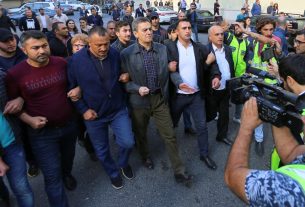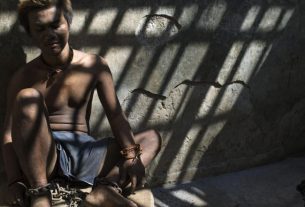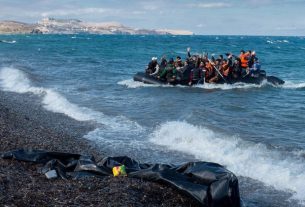(Washington) – United States and Libyan authorities should clarify the legal basis for the abusive arrest and subsequent extradition to the US of a Libyan suspect in the 1988 deadly airplane bombing over Lockerbie, Scotland, Human Rights Watch said today. US authorities on December 12, 2022, announced that they had custody of and intended to prosecute Abu Agela Masud Kheir Al-Marimi, a former official of the government of the late Libyan leader Muammar Gaddafi, after an armed group seized him from his home in Tripoli.
“It appears that no Libyan court ordered or reviewed Masud’s transfer to the US, and he had no chance to appeal, raising serious due process concerns,” said Hanan Salah, associate Middle East and North Africa director at Human Rights Watch. “The political impasse and chaos in Libya don’t allow US authorities to disregard violations of fundamental rights.”
The Tripoli-based Libyan prime minister, Abdelhamid Dabeiba, said his Government of National Unity (GNU) collaborated with the US on the transfer, while Libyan judicial authorities have challenged the handover’s legality and opened an investigation. Libya and the US have no extradition treaty.
The US should uphold international fair trial standards and grant Masud access to his family members, including by promptly processing visas for them. US authorities should also grant him the right to challenge his extradition. As Prime Minister Dabeiba promised, Libyan authorities should provide consular visits, help Masud get effective legal counsel, and coordinate his family’s visits. They should also investigate and hold accountable members of the armed group responsible for violently seizing Masud from his home.
Masud is the third Libyan in the last decade transferred to the US under murky legal circumstances to stand trial on a terrorism-related charge.
The US had long sought Masud’s arrest for his alleged role in the Lockerbie bombing. The apparent basis for the charges are confessions he allegedly made in 2012 to a Libyan interrogator. A relative of Masud told Human Rights Watch that family members had no prior notification of the extradition, and learned about it from social media posts about his appearance in a US court on December 12. They said they knew of no judicial procedures before he was sent from Libya, and spoke with him by phone for the first time on February 10, two months after his transfer to the US. He faces a maximum sentence of life in prison.
On December 21, 1988, Pan Am Flight 103 exploded over Lockerbie, killing 224 people, including all of the passengers, 190 of them US citizens, and some people in the town. In November 1991, Scottish authorities and the US charged two Libyan intelligence operatives in connection with the bombing. Abdel Baset Ali al-Megrahi was found guilty in 2001 and sentenced to life in prison, but was released in 2009 on compassionate grounds due to advanced terminal illness and died in 2012. The other suspect, Lamen Khalifa Fhimah, was acquitted.
Masud was not under an arrest warrant in Libya, said his relative, when he was seized on November 17 in his home in the Abu Salim district of Tripoli by an armed group whose members refused to identify themselves during the arrest, wore no insignias, and came in cars that were unmarked. They took him to an undisclosed location, his relative said. However, Abu Salim district is controlled by the Stability Support Apparatus, which also controls parts of the Libyan capital and is aligned with the GNU prime minister.
Armed group members arrived at around 1:30 a.m., the relative said. The group stationed armed men in front of the homes of Masud and of other family members nearby, barring everyone from leaving. Members of the group shoved Masud’s wife and beat his daughter, who needed medical attention for her hands after the incident, the relative said. They also beat one of Masud’s sons with a rifle. They dragged Masud, 71, whose mobility was reduced due to illness, across the floor, refusing help from family members to carry him.
The Abu Salim police refused to record a kidnapping complaint brought by the family the next day, prompting the family to contact armed groups and the General Prosecutor’s Office to try to find out where he was, the family member said.
On November 24 or 25, a week later, Masud called to tell his family he was being held in Misrata, 200 kilometers east of the capital, by an armed group allied with Prime Minister Dabeiba known as the Joint Force, and under Omar Bughdada’s command. The group permitted Masud to call his relatives and permitted the family to visit him twice in Misrata before his transfer to the US. On December 11, authorities in Scotland announced that Masud had been taken into US custody.
On December 12, the US Department of State announced that Masud had been taken before a court in Washington, DC, to face two criminal counts, including destruction of an aircraft resulting in death, based on charges filed by the Justice Department in December 2020.
US authorities gave no details on Masud’s arrest and transfer in the absence of an extradition treaty. The US Embassy in Tunis, which covers Libya, tweeted that Masud’s transfer “was lawful and conducted in cooperation with Libyan authorities,” and that it “followed Interpol publishing a Red Notice for Masud in January 2022,” requesting member countries to arrest him for transfer to the US.
In a Statement of Facts from 2020, the US Justice Department maintains that there is probable cause that Masud conspired with others, and aided and abetted them, in causing the destruction of Pan Am flight 103. This affidavit, submitted to support the charges, said that the US appears to build its case around a confession allegedly made by Masud to an unidentified Libyan operative on September 12, 2012, while Masud was detained in Libya. US authorities obtained an English translation of the transcript of the interrogation in 2017. Anti-Gaddafi fighters had detained Masud in 2011 after the revolution in Libya. In 2015, following a mass trial marred by serious due process violations, a Tripoli criminal court sentenced him to 10 years in prison for his role in booby-trapping cars during the 2011 revolution and 31 other former Gaddafi officials to various prison terms. Masud was ordered released in 2021 on medical grounds.
During his years in Libyan custody, Human Rights Watch documented the use of torture, intimidation, and other abuses in Libyan facilities, often to extract confessions. Libya’s justice system was and remains marked by serious due process violations. US authorities should ensure that no coerced confessions, including confessions made under torture, are used as part of the prosecution, in violation of US and international law, Human Rights Watch said.
Libyan authorities did not respond to the allegations that they participated in a possibly unlawful extradition until December 16, when Dabeiba stated on TV that he had cooperated with US authorities in the transfer. Dabeiba called Masud a “terrorist” but did not clarify the legal basis for the extradition. In a statement on December 14, Libya’s general prosecutor confirmed that his office had not been part of the extradition and that he had opened an investigation into whether Masud was extrajudicially transferred.
While Prime Minister Dabeiba pledged in the TV statement that Masud would get consular and family visits and that the Libyan government would pay his legal costs, this has yet to happen. Masud’s family has hired only a temporary legal counsel who met with Masud upon his arraignment in the US.
In October 2013, US authorities, with the support of Libyan armed groups, transferred Abu Anas Al-Libi, also known as Nazih al-Ruqhai, to the US to face prosecution for his alleged role in the 1998 bombings of the US embassies in Nairobi and Tanzania that killed 270 people. Al-Ruqhai’s Libyan-based family had tried to obtain visas to visit him after his extradition to the US, but the US did not approve them, his relatives told Human Rights Watch, and he died in 2015 while on trial.
Ahmed Abu Khatallah, also known as Ahmed Mukatallah, was seized in Benghazi in June 2014 and subsequently transferred to the US. Libyan judicial authorities at the time said his transfer had been unlawful. After being tried and convicted in a US court in 2017, he was sentenced to 22 years in prison for his role in the September 11, 2012, attack on a US embassy annex in Benghazi that killed Ambassador J. Christopher Stevens and three US government personnel.
“Justice for the many victims of Pan Am flight 103 risks being tainted unless the US and GNU governments clarify the legal basis for Masud’s transfer to US custody,” Salah said.


